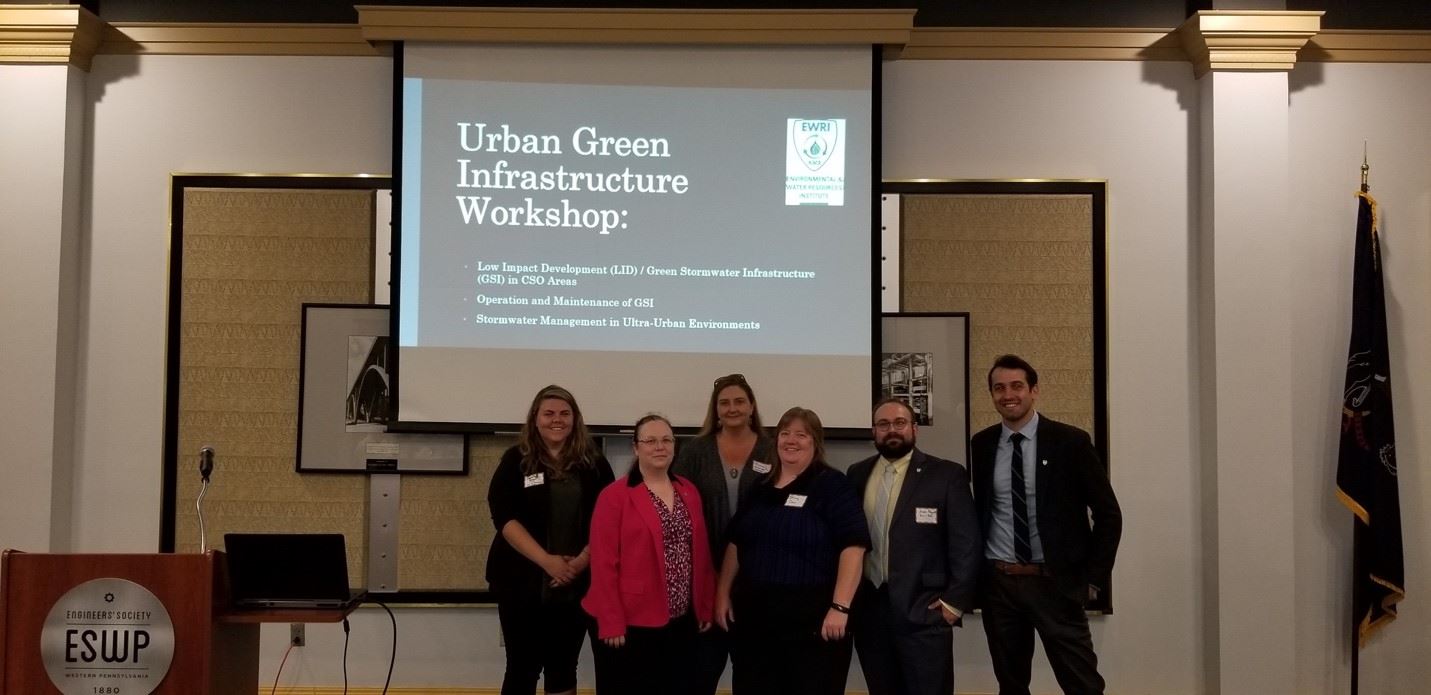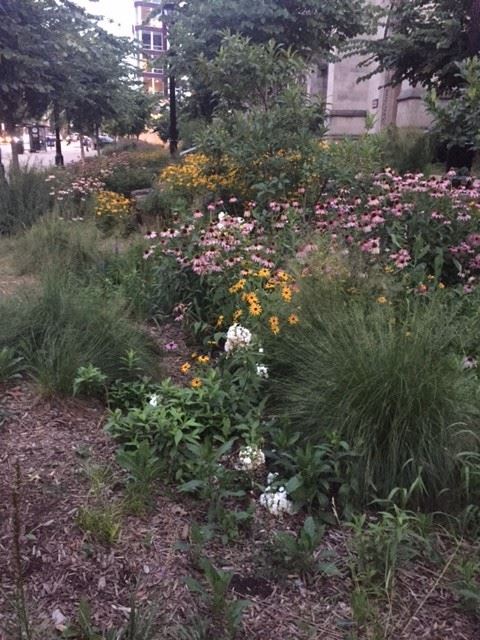By: Christina Urbanczyk and Lauren Cook
 Increasing rainfall intensity in Southwestern Pennsylvania has brought stormwater management to the forefront of the public eye. As a result, Green Stormwater Infrastructure (GSI) has gained more attention as a cost-effective solution to help manage the impacts from wet weather. On July 26, 2018, the local Environmental Water Resource Institute (EWRI) Pittsburgh chapter partnered with representatives from the EWRI National Technical Councils to host an afternoon workshop on Urban Green Infrastructure. The workshop provided national and local expertise on Low Impact Development in combined sewer overflow (CSO) areas, operation and maintenance of Green Stormwater Infrastructure (GSI), and stormwater management in the ultra-urban environment.
Increasing rainfall intensity in Southwestern Pennsylvania has brought stormwater management to the forefront of the public eye. As a result, Green Stormwater Infrastructure (GSI) has gained more attention as a cost-effective solution to help manage the impacts from wet weather. On July 26, 2018, the local Environmental Water Resource Institute (EWRI) Pittsburgh chapter partnered with representatives from the EWRI National Technical Councils to host an afternoon workshop on Urban Green Infrastructure. The workshop provided national and local expertise on Low Impact Development in combined sewer overflow (CSO) areas, operation and maintenance of Green Stormwater Infrastructure (GSI), and stormwater management in the ultra-urban environment.
National and local speakers presented a variety of topics related to GSI, including pilot studies, funding mechanisms, research, and lessons learned. Speakers included Shirley Clark, Penn State University; Tim Prevost, Allegheny County Sanitary Authority (ALCOSAN); Barton Kirk, Ethos Collaborative; Matt Zambelli, MLZDesign; Ruth Hocker, City of Lancaster; Greg Scott, Buchart Horn, Inc; Ryan Quinn, Pittsburgh Sewer and Water Authority (PWSA); Rosanna LaPlante, City of Baltimore; and Jordan Fischbach, RAND Corporation.
Shirley Clark (Penn State University) discussed numerous case studies of GSI in CSO areas across the U.S., including in Portland, Philadelphia, Kansas City, Seattle, and St. Louis. She emphasized that a combination of green and grey infrastructure is more cost effective than a grey only solution, even when co-benefits of GSI are excluded. She also highlighted that municipalities should focus on using public right-of-ways for GSI, rather than relying on private owners to maintain the infrastructure.
Rosanna LaPlante (City of Baltimore) discussed the importance of public outreach and using the National GI Certification Program to train individuals that inspect and maintain GSI. Also, the City of Baltimore uses an urban waters interactive map to show locations of existing BMPs and identify locations where BMPs may not be as feasible due to existing conditions such as site soils, existing utilities, etc.
Ruth Hocker (City of Lancaster) provided lessons learned from Lancaster’s stormwater program, which includes a stormwater fee, regulations of development at any scale, and the ability for residents to “Adopt a BMP.” According to Hocker, training and participation of field staff is a vital part of a successful GSI program. She recommended designing GSI with maintenance in mind, inspecting regularly, and using appropriate plant material by considering the effect of surrounding surface areas and localized pollutants like road salts. Adopting these recommendations may contribute to the success of GSI implementation nationwide.
Barton Kirk (Ethos Collaborative) and Matt Zambelli (MLZDesign), professionals with experience in design, monitoring, and maintenance of GSI, provided an overview of several local GSI projects in Pittsburgh, including: bioswales, porous pavement, and street planters with an underdrain. Recent monitoring of a project at Oakwood and Batavia during a 10-year storm event (2.9 inches of rainfall over 11 hours) showed an infiltration rate of 7 inch/hour. Some of these projects are summarized on the Westmoreland Conservation District’s Interactive Best Management Practice (BMP) map.
Greg Scott (Buchart Horn, Inc) discussed the design of a GSI project that will help address extensive flooding in the Shadyside neighborhood near Maryland Avenue in Pittsburgh. The ongoing project is a neighborhood-level stormwater project that uses an integrated design approach with several elements including new inlets and conveyance, green infrastructure, and underground storage. They are also evaluating the possibility of connecting residential downspouts to the integrated GSI system.
 Jordan Fischbach (RAND Corporation) presented a research study about “Robust Stormwater Management in the Pittsburgh Region,” which evaluated combinations of green and grey infrastructure to reduce combined sewer overflows under current and future conditions. RAND worked with ALCOSAN to simulate CSOs and analyze vulnerability of their existing system to future rainfall, population and land-use changes. Results emphasize the need to evaluate a range of uncertain, future changes to inform near-term stormwater and wastewater infrastructure investments. The full report is available on RAND’s website.
Jordan Fischbach (RAND Corporation) presented a research study about “Robust Stormwater Management in the Pittsburgh Region,” which evaluated combinations of green and grey infrastructure to reduce combined sewer overflows under current and future conditions. RAND worked with ALCOSAN to simulate CSOs and analyze vulnerability of their existing system to future rainfall, population and land-use changes. Results emphasize the need to evaluate a range of uncertain, future changes to inform near-term stormwater and wastewater infrastructure investments. The full report is available on RAND’s website.
The workshop also covered the importance of funding opportunities for GSI in Southwestern PA. Tim Prevost (ALCOSAN) discussed the GROW program, which awards grants to customer municipalities to implement stormwater reduction projects. The program, currently in its third cycle, has awarded 9 million dollars in project funding. Ryan Quinn (PWSA) emphasized prioritizing partnerships to fund GSI projects, referencing PWSA’s previous and ongoing partnerships with ALCOSAN, the Saw Mill Run Watershed Association, Pittsburgh Parks Conservancy, and neighborhood groups.
This workshop provided a wide range of information about local and national GSI implementation in urban areas. Key take-aways included: (1) a combination of green and grey infrastructure is more cost-effective than grey only, (2) design of green infrastructure systems should be robust and adaptive (3) green infrastructure performance often exceeds expectations, (4) a dedicated maintenance team is vital for continued success, (5) GSI can help enhance resilience in cities that are susceptible to increases in extreme rainfall.
 The event was hosted at the Engineers Western Society of Pennsylvania in downtown Pittsburgh, PA in partnership with ALCOSAN, Allegheny County Conservation District, Allegheny Watershed Alliance, American Public Works Association, Nine Mile Run Watershed Association, PWSA, Saw Mill Run Watershed Association, Southwestern Pennsylvania Commission Water Resource Center, Stormworks, Westmoreland Conservation District, and 3 Rivers Wet Weather. Thank you to these sponsors for helping make this workshop possible.
The event was hosted at the Engineers Western Society of Pennsylvania in downtown Pittsburgh, PA in partnership with ALCOSAN, Allegheny County Conservation District, Allegheny Watershed Alliance, American Public Works Association, Nine Mile Run Watershed Association, PWSA, Saw Mill Run Watershed Association, Southwestern Pennsylvania Commission Water Resource Center, Stormworks, Westmoreland Conservation District, and 3 Rivers Wet Weather. Thank you to these sponsors for helping make this workshop possible.
EWRI Congress will be held in Pittsburgh on May 19-23, 2019. Abstracts are being accepted until September 10th.
